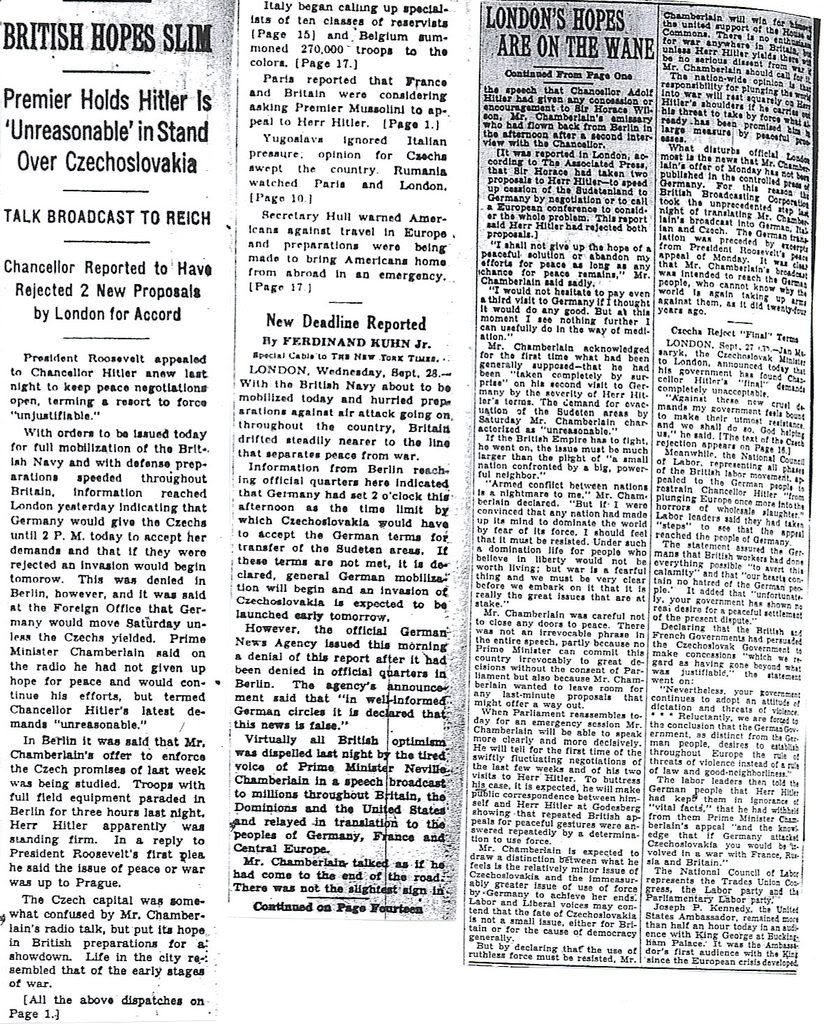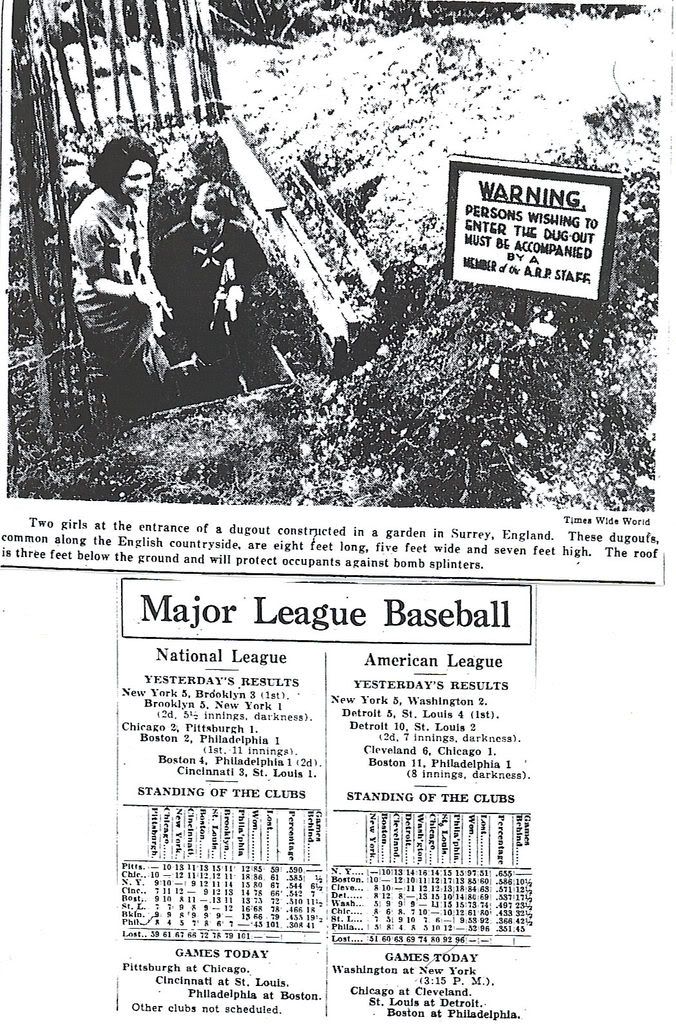
Posted on 09/28/2008 6:22:15 AM PDT by Homer_J_Simpson



In sports - The Cubs beat Pittsburgh yesterday to move within a half game of the Pirates. They play again today with the pennant on the line as the season winds down.
Deep gloom hung over Berlin, Prague, London and Paris as "Black Wednesday," September 28, dawned. War seemed inevitable.
"A Great War can hardly be avoided any longer," Jodl quoted Goering as saying that morning. "It may last seven years, and we will win it."
In London the digging of trenches, the evacuation of school children, the emptying of hospitals, continued. In Paris there was a scramble for the choked trains leaving the city, and the motor traffic out of the capital was jammed. There were similar scenes in western Germany. Jodl jotted in his diary that morning reports of German refugees fleeing from the border regions. At 2 P.M. Hitler's time limit for Czechoslovakia's acceptance of the Godesberg proposals would run out. There was no sign from Prague that they would be accepted. There were, however, certain other signs: great activity in the Wilhelmstrasse; a frantic coming and going of the French, British and Italian ambassadors. But of these the general public and indeed the German generals remained ignorant.
At eleven o'clock that morning of September 28 the phone rang at Kordt's desk in the Foreign Office. Ciano was on the line from Rome and wanted urgently to speak to the German Foreign Minister. Ribbentrop was not available—he was at the Reich Chancellery—so the Italian Foreign Minister asked to be put through to his ambassador, Bernardo Attolico. The Germans listened in and recorded the call. It developed that Mussolini, and not his son-in-law, wanted to do the talking.
MUSSOLINI: This is the Duce speaking. Can you hear me?
ATTOLICO: Yes, I hear you.
MUSSOLINI: Ask immediately for an interview with the Chancellor. Tell him the British government asked me through Lord Perth [the British ambassador in Rome] to mediate in the Sudeten question. The point of difference is very small. Tell the Chancellor that I and Fascist Italy stand behind him. He must decide. But tell him I favor accepting the suggestion. You hear me?
ATTOLICO: Yes, I hear you.
MUSSOLINI: Hurry!
Out of breath, his face flushed with excitement (as Dr. Schmidt, the interpreter, noted), Ambassador Attolico arrived at the Chancellery to find that the French ambassador was already closeted with Hitler. M. Francois-Poncet had had a hard time getting there. Very late the night before, Bonnet, the French Foreign Minister, who was now intent on going Chamberlain one better, had telephoned his ambassador in Berlin and instructed him to see Hitler at the earliest possible moment and present a French proposal for surrendering the Sudetenland which went much further than the British plan. Whereas the Prime Minister's proposal, delivered to Hitler at 11 P.M. on September 27, offered Hitler the occupation of Zone I of the Sudetenland by October 1—a mere token occupation of a tiny enclave—the French now proposed to hand over three large zones, which comprised most of the disputed territory, by October 1.
It was a tempting offer, but the French ambassador had great difficulty in making it. He phoned at 8 A.M. on September 28 for an appointment with the Chancellor and when no response had been received by ten o'clock rushed his military attache off to the Army General Staff to inform the German generals of the offer which he was as yet unable to deliver. He enlisted the aid of the British ambassador. Sir Nevile Henderson, who was only too ready to oblige anyone who might help prevent a war—at any cost—telephoned Goering, and the Field Marshal said he would try to make the appointment. As a matter of fact, Henderson was trying to make one for himself, for he had been instructed to present to Hitler "a final personal message from the Prime Minister," the one which Chamberlain had drafted late the night before, assuring Hitler that he could get everything he wanted "without war, and without delay," and proposing a conference of the powers to work out the details.
Hitler received Francois-Poncet at 11:15 A.M. The ambassador found him nervous and tense. Brandishing a map which he had hastily drawn up and which showed the large chunks of Czech territory which Czechoslovakia's principal ally was now prepared to hand over to Hitler on a platter, the French ambassador urged the Fuehrer to accept the French proposals and spare Europe from war. Despite Ribbentrop's negative comments, which Francois-Poncet says he dealt "roundly" with, Hitler was impressed—especially, as Dr. Schmidt noted, by the ambassador's map, with its generous markings.
At 11:40 the interview was suddenly interrupted by a messenger who announced that Attolico had just arrived with an urgent message for the Fuehrer from Mussolini. Hitler left the room, with Schmidt, to greet the panting Italian ambassador.
"I have an urgent message to you from the Duce!" Attolico, who had a naturally hoarse voice, shouted from some distance off. After delivering it, he added that Mussolini begged the Fuehrer to refrain from mobilization.
It was at this moment, says Schmidt, the only surviving eyewitness of the scene, that the decision for peace was made. It was now just noon, two hours before the time limit on Hitler's ultimatum to the Czechs ran out.
"Tell the Duce," Hitler said, with obvious relief, to Attolico, "that I accept his proposal."
The rest of the day was anticlimactic. Ambassador Henderson followed Attolico and Francois-Poncet to the Fuehrer's presence.
"At the request of my great friend and ally, Mussolini," Hitler told Henderson, "I have postponed mobilizing my troops for twenty-four hours." He would give his decision on other matters, such as the proposed conference of the powers, after he had again consulted Mussolini.
There followed much telephoning between Berlin and Rome—Schmidt says the two fascist dictators talked directly once. A few minutes before 2 P.M. on September 28, just as his ultimatum was to expire, Hitler made up his mind and invitations were hastily issued to the heads of government of Great Britain, France and Italy to meet the Fuehrer at Munich at noon on the following day to settle the Czech question. No invitation was sent to Prague or Moscow. Russia, the coguarantor of Czechoslovakia's integrity in case of a German attack, was not to be allowed to interfere. The Czechs were not even asked to be present at their own death sentence.
In his memoirs Sir Nevile Henderson gave most of the credit for saving the peace at this moment to Mussolini, and in this he has been backed by most of the historians who have written of this chapter in European history. But surely this is being overgenerous. Italy was the weakest of the Big Powers in Europe and her military strength was so negligible that the German generals, as their papers make clear, treated it as a joke. Great Britain and France were the only powers that counted in German calculations. And it was the British Prime Minister who, from the start, had sought to convince Hitler that he could get the Sudetenland without a war. Chamberlain, not Mussolini, made Munich possible, and thus preserved the peace for exactly eleven months. The cost of such a feat to his own country and to its allies and friends will be considered later, but it was, by any accounting, as it turned out, almost beyond bearing.
At five minutes to three on "Black Wednesday," which now appeared less dark than it had in the bleak morning hours, the British Prime Minister had begun to address the House of Commons in London, giving a detailed account of the Czech crisis and of the part which he and his government had played in trying to solve it. The situation he depicted was still uncertain, but it had improved. Mussolini, he said, had succeeded in getting Hitler to postpone mobilization for twenty-four hours. It was now 4:15, and Chamberlain had been speaking for an hour and twenty minutes and was nearing the end of his speech. At this point he was interrupted. Sir John Simon, the Chancellor of the Exchequer, passed him a paper which had been handed down to the Treasury front bench by Lord Halifax, who had been sitting in the peers' gallery.
Whatever view honorable members may have had about Signer Mussolini [Chamberlain was saying] I believe that everyone will welcome his gesture . . . for peace.
The Prime Minister paused, glanced at the paper, and smiled.
That is not all. I have something further to say to the House yet. I have now been informed by Herr Hitler that he invites me to meet him at Munich tomorrow morning. He has also invited Signor Mussolini and Monsieur Daladier. Signor Mussolini has accepted and I have no doubt Monsieur Daladier will accept. I need not say what my answer will be ...
There was no need. The ancient chamber, the Mother of Parliaments, reacted with a mass hysteria without precedent in its long history. There was wild shouting and a wild throwing of order papers into the air and many were in tears and one voice was heard above the tumult which seemed to express the deep sentiments of all: "Thank God for the Prime Minister!"
Jan Masaryk, the Czech minister, the son of the founding father of the Czechoslovak Republic, looked on from the diplomatic gallery, unable to believe his eyes. Later he called on the Prime Minister and the Foreign Secretary in Downing Street to find out whether his country, which would have to make all the sacrifices, would be invited to Munich. Chamberlain and Halifax answered that it would not, that Hitler would not stand for it. Masaryk gazed at the two God-fearing Englishmen and struggled to keep control of himself.
"If you have sacrificed my nation to preserve the peace of the world," he finally said, "I will be the first to applaud you. But if not, gentlemen, God help your souls!"
William L. Shirer, The Rise and Fall of the Third Reich, pp. 404-405, 408-411
This was the year Johhy VanDemeer pitched two no hitters for the Reds. Mr VanDemeer had given my grandmother an autographed ball. After being kept by her for twenty years or so my older brother grabbed it and we played ball with it. Kids!
I posted the story of the second no-hitter. It was also the first game under the lights at Ebbets field. I will dig it up and ping it to you later when I have time.
Thank you for the thread and ping.
Disclaimer: Opinions posted on Free Republic are those of the individual posters and do not necessarily represent the opinion of Free Republic or its management. All materials posted herein are protected by copyright law and the exemption for fair use of copyrighted works.